Can Non-Residents or Foreigners Buy Property in the UK?
Can non-UK residents buy a property in the UK?
Yes, non-UK residents are able to purchase property in the United Kingdom. However, there are some important considerations to keep in mind when doing so.
It can be crucial to understand the legal process of buying property, as it may be different to that of your home country. This will typically involve hiring a conveyancing solicitor to handle the legal aspects of the transaction, as well as a surveyor to assess the condition of the property. Non-UK residents may also need to obtain a mortgage from a UK lender in order to finance the purchase.
Purchasing property in the United Kingdom can be an appealing investment option for foreign investors, and can provide them with a steady income. However, the process of buying property in the UK can be complex for those who are not familiar with the legal and financial system.
Non-UK residents hold £90.7bn worth of property in the UK (Property Industry Eye). In this guide, we will explore important considerations that non-UK residents must make when purchasing a property in the UK, such as legal requirements, tax implications, and currency exchange rates. Whether you want to purchase a second home or an investment property, this article will provide you with the key information you need to navigate the process with confidence.
Want to speak to a professional about buying a property as a non-resident?
Speak to Raw Mortgages >>
Do non-UK residents pay more tax when buying UK property?
Yes, they can. For example, non-UK residents may be subject to higher stamp duty rates on their purchase, as well as potential capital gains tax if they sell the property in the future. You should consider whether it might be worth it to consult with a tax advisor to help you fully understand the tax implications of buying property in the UK.
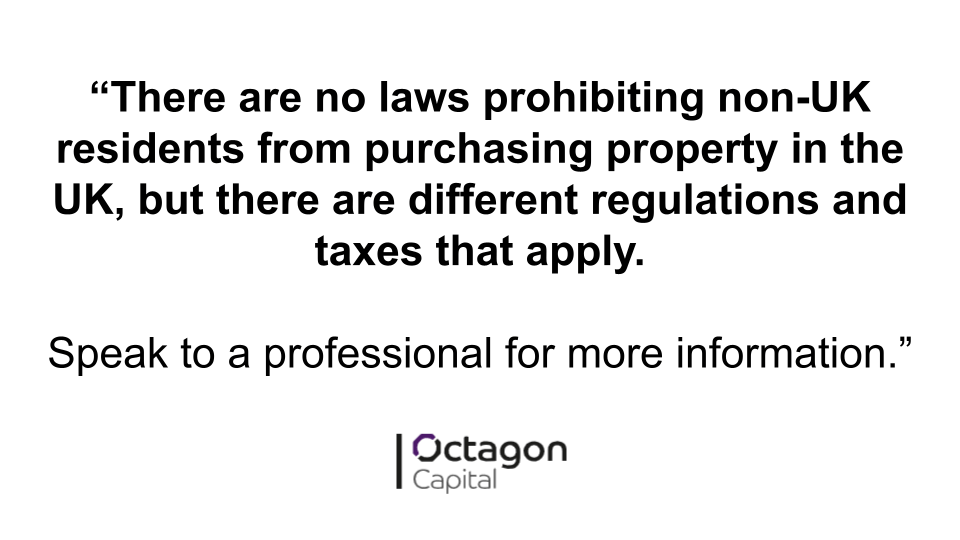
What else should they consider?
Another important consideration for non-UK residents is the currency exchange rate. The exchange rate between the pound and other currencies will fluctuate, which can have a significant impact on the overall cost of buying a property in the UK. Keep an eye on the exchange rate and consider using a currency exchange specialist to help minimize the impact of currency fluctuations.
Currency rates will be important when purchasing the property, but also when dealing with fees. There will be upfront costs including surveys, legal fees and Stamp Duty Land Tax (SDLT), and also ongoing costs like insurance, mortgage repayment, and repairs.
You can reduce at least some of these costs by checking the property’s Energy Performance Certificate (EPC). This rates houses from A (best) to G (worst) on their energy performance. Buying a property with a good score can lead to savings down the line.
Another thing to consider is location. As with any property purchase, location is a key factor to consider. Non-UK residents should research different areas and neighborhoods to find a location that meets their needs and preferences.
Non-UK residents should also check what paperwork they may need to do before they start their purchase. They might need to look at visa requirements for entering and exiting the UK, as well as the length of time they are permitted to stay in the country.Non-UK residents should also ensure they have the appropriate insurance in place to protect their property, such as building and contents insurance.
Is it difficult for foreign investors to buy UK property?
It can be, but it is not necessarily. The legal and financial process of buying property in the UK is similar for both domestic and foreign buyers. However, foreign investors may face some additional challenges, such as language barriers, cultural differences, and a lack of familiarity with the UK property market.
For example, foreign investors may need to navigate the legal and financial systems of the UK, which can be complex and confusing for those unfamiliar with the process. They may also need to find a reliable solicitor, surveyor, and mortgage lender who is experienced in working with international buyers.
Finally, foreign investors may have a slightly harder time getting a mortgage. Working with a specialist lender can help solve this problem.
Can Mortgages be Transferred?
Making the decision to transfer your mortgage and completing the transfer is sometimes quick and easy, but can also be a tiresome exercise if you don't know all the information about the process ahead of you. Oftentimes, when people choose to transfer their mortgage, it has been a considered decision that reflects the best interests of everyone involved – but they still might not have all the knowledge they need to start the process of transferring a mortgage.
In this Octagon Capital guide, we've broken down everything you need to know about mortgage transfers, including: what a mortgage transfer is, what an equity transfer is, if joint mortgages can be transferred to one person, if you can move your mortgage to another house, and amongst other things, how mortgages work when you decide to move house.
What is a mortgage transfer?
Sometimes known as porting a mortgage, a mortgage transfer is when you move your mortgage from the property it is currently for, to a new property. Mortgage transfer can also refer to the process of adding, removing or replacing a person on a mortgage agreement, such as in a divorce or separation.
Many people are not very informed of the ins and outs of the process of mortgage transfer, and have many questions when it comes to how it all works. That's why we've compiled this guide of what you need to know when transferring a mortgage – whether to another property or to someone else.
What is an equity transfer?
An equity transfer is where a person on the mortgage agreement is added, replaced, or removed. This is sometimes just known as a mortgage transfer, showing how important it is to know the different terminology that can be used throughout the process to ensure you make the most informed decision you can.
Equity refers to the portion of the property that a person legally owns. This is worked out through the amount of the mortgage that has already been repayed, as well as the split between people on the same mortgage. This equity is then taken on by another person.
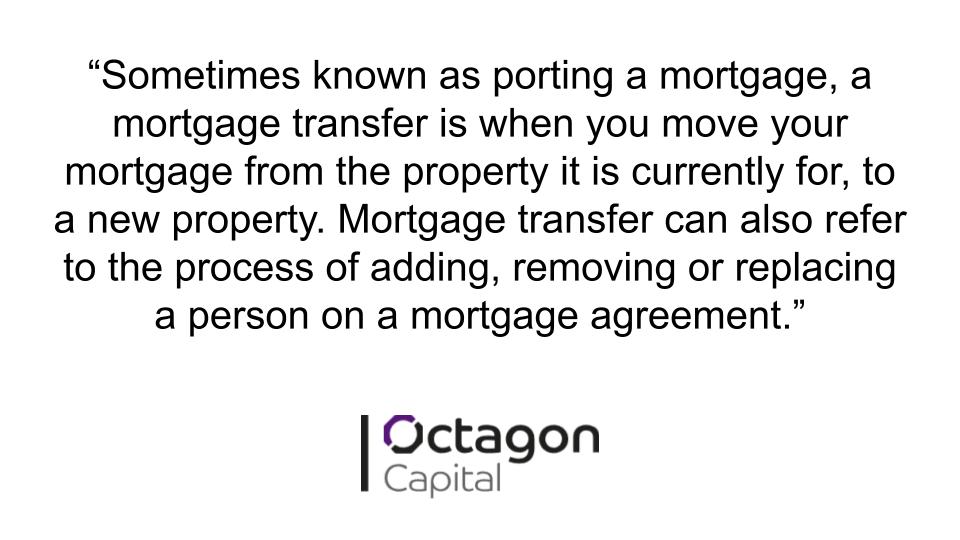
Can mortgages be transferred? FAQs
If you've never transferred your mortgage to another property or person, it can be difficult to know how it works and which changes are allowed, and which are not. We've brought together all of our most frequently asked questions about mortgage transfers and equity transfers to help you throughout your mortgage transfer.
Can a joint mortgage be transferred to one person?
Yes, it is possible to transfer a joint mortgage to one person through a transfer of equity. It's important to make yourself aware of your lender's rules or policy on mortgage transfer so you know what to expect.
Before the joint mortgage can be transferred to one person, your lender, whether your current lender or a new mortgage lender that you would like to switch to, will want to make sure that you can afford to pay the mortgage off on your own. They will conduct various affordability checks to make sure you can afford the monthly repayments and will likely check your credit history too.
If the lender deems you eligible to transfer your joint mortgage, one partner usually buys out the other person's portion of the mortgage. If your lender doesn't offer what you need, there is the option to remortgage and find a new lender with a better interest rate.
Can a mortgage be transferred in a divorce?
Yes, mortgages can be transferred in a divorce or separation. The same process applies in this instance as for any other instance of transferring a joint mortgage to one person. We've covered this in more detail in a previous article, which you can find here.
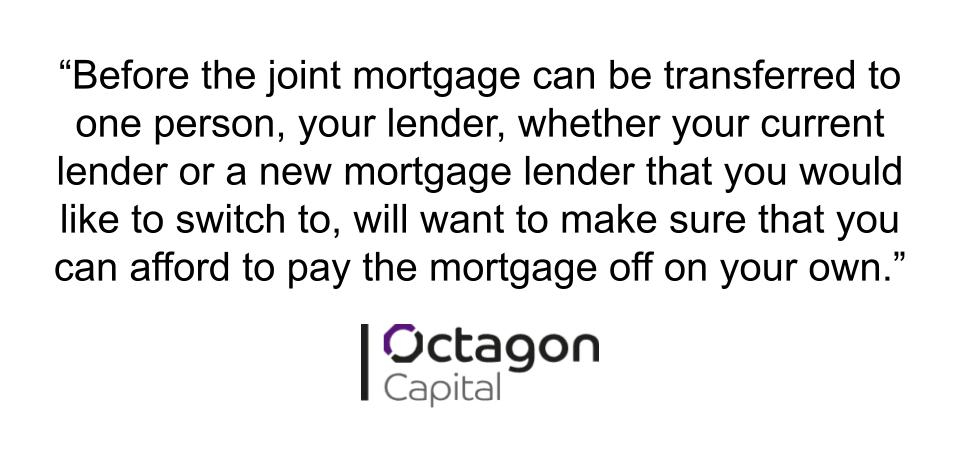
Can I move my mortgage to another house?
It is possible to move your mortgage to another property – by 'porting' your mortgage – in many instances.
However, some people do struggle to port their mortgage. The main reasons why some people struggle to transfer their mortgage to another property is because they no longer pass any revised affordability checks from their lender, or they are looking to borrow a larger sum of money. It's important to note that being unable to transfer your mortgage is not the same as being unable to swap your mortgage, wherein borrowers are 'mortgage prisoners'.
How do mortgages work when you move house?
When you move house to a new property, your mortgage needs to either be transferred to another property or to another person who will become financially responsible for the property. When porting your mortgage to a different property, you can either stick with the same lender if they have a low interest rate, or remortgage with a lender who offers a better interest rate. It's essential here to check if there will be any exit fees for remortgaging, as these should always be factored into your predicted costs.
As always, before committing and making any big financial decisions, it is absolutely imperative to speak to mortgage advisers and also to make sure that you can afford the move you want to make through a mortgage transfer. Make sure that you are only ever borrowing what you know you can afford to pay back. Defaulting on mortgage repayments or any other loan repayments can result in a cycle of debt due to late fees, as well as a damaged credit score and history.
What Can be Done to Help Mortgage Prisoners?
With the current cost of living crisis, many people feel like as soon as they see a better deal they need to take it. This applies for mortgages too, but unfortunately not for every mortgage holder. Some people find it incredibly difficult to make the switch with their mortgage from a bad deal to one with a better deal – essentially making them 'mortgage prisoners'.
Mortgage prisoners can become stuck in their current mortgage for a variety of reasons, and each case is different. However, in this Octagon Capital guide, we discuss what can be done to help mortgage prisoners swap to a better mortgage deal, as well as how to identify if you could be a 'mortgage prisoner'.
What is a Mortgage Prisoner?
A mortgage prisoner is a person who finds it incredibly difficult to switch their high cost mortgage to a new one with a better deal, despite being up-to-date with their mortgage re-payments.
For many mortgage prisoners, they took out a mortgage before 2014 to purchase their home. Since then, the criteria to be eligible to take out a mortgage has become far stricter, meaning that while they passed an eligibility assessment before 2014, they may not pass an affordability check in the present day. The newer affordability assessments consider both your income and your expenses to more accurately assess if you can afford to make the repayments on the mortgage in question.
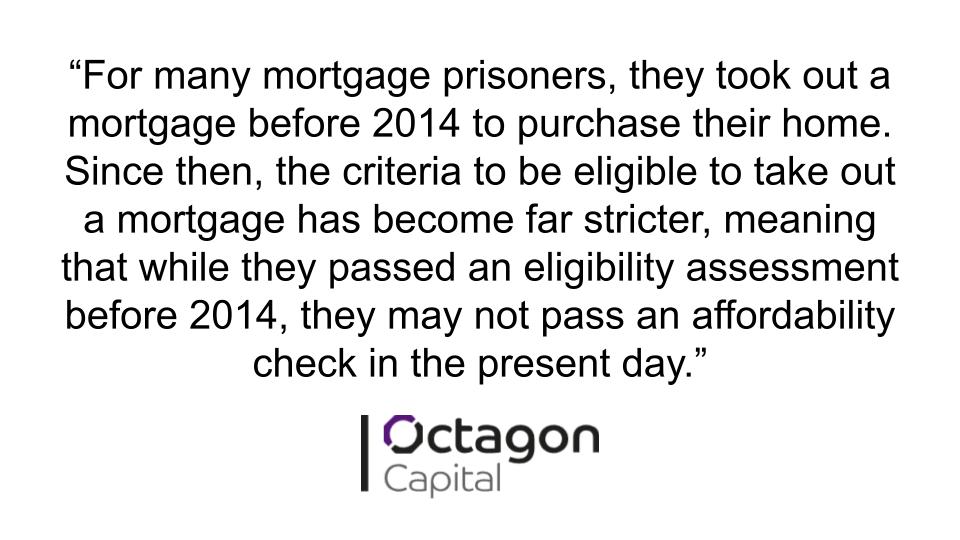
Estimates from Money Saving Expert suggest that staggeringly, there could be up to 200,000 mortgage prisoners in the UK. These people are all borrowers who have taken out mortgages with now inactive firms who are no longer offering mortgages to new customers – borrowers in 'closed book' mortgages. The Financial Conduct Authority (FCA) suggests that of this group of mortgage prisoners in the UK, around one in three "should" be able to make the switch to a better deal.
It can be incredibly difficult to accurately report on the amount of mortgage prisoners at any one time, as many may not be aware that they could be getting a better deal elsewhere. As such, we've broken down how you can determine if you might in fact be a mortgage prisoner, unknowingly tied into a high-cost mortgage.
Am I a Mortgage Prisoner?
Many people only find out that they are in fact a mortgage prisoner when they decide to try and find a lower cost mortgage and realise that they are unable to do so.
When trying to figure out if you could be a mortgage prisoner, consider your answers to the following two questions:
- Did you purchase your home, or remortgage it, before the introduction of the stricter affordability rules in 2014 that we mentioned earlier?
- Have you been told in the past you can't switch to a more competitive, cheaper deal?
If you find yourself answering "yes" to both of these questions, there is a strong chance that you could be a mortgage prisoner.
It can be hard to wrap your head around mortgages and the process of changing your mortgage, let alone if you're a mortgage prisoner. We've included some information about the things that can help mortgage prisoners in their situation.
What Can Help Mortgage Prisoners?
The FCA introduced changes to the rules and regulations surrounding mortgages in October 2019, meaning some borrowers could be able to switch over to a more competitive and affordable mortgage. The FCA's rules check your mortgage payment history, rather than solely considering the affordability of your mortgage.
If this applies to you, you will have received an official letter before January 2020. This letter will confirm that you are unable to switch mortgages to a more affordable deal, and that you might be able to benefit from these changes to regulation. Please note: having received a letter does not mean you are automatically eligible to switch your mortgage to one with a different lender.
Do I qualify to switch mortgages under the new rules?
If you have received the letter confirming you are unable to switch mortgages to a better deal before January 2022 and apply to switch your mortgage, lenders will use different criteria to decide whether they will accept your application.
As we mentioned earlier, the FCA uses a different criteria to the one previously used, opting to consider a person'd mortgage payment history as well as their affordability. It's likely that lenders will want to know about your repayment history, as well as your repayment plan.
The criteria used to determine if you can swap your mortgage to a different lender vary from lender to lender, but according to Money Helper, might include: a copy of the 'mortgage prisoner' letter, a minimum of five years remaining on your mortgage, at least £50,000 remaining on your mortgage, a minimum property value of £60,000, a LTV of no more than 85%, not having a buy-to-let mortgage, no changes to who took out the original mortgage, no missed mortgage payments and a clear repayment plan.
Can I Switch to a Fixed Rate Mortgage?
The process of buying a house can be exciting and scary at the same time. When it comes to taking out a mortgage to help you buy the property of your dreams, you need to make sure you're clued up on what the different types of mortgage available to you are, and how they differ.
Fixed rate mortgages offer some well-needed stability in the current cost-of-living crisis. As people with fixed rate mortgages are able to predict what their monthly mortgage bill will be, they are better able to budget their finances. If you don't have a fixed rate mortgage, you may feel stuck paying high interest rates with little way to predict what these payments could go up to. The good news is that it is possible to switch to a fixed rate mortgage.
Our Octagon Capital blog explores what fixed rate mortgages are, what impacts your eligibility for one, the benefits and disadvantages of fixed rate mortgages, and whether or not it is possible to switch to a fixed rate mortgage from a variable mortgage. Read on to find out more.
What is a Fixed Rate Mortgage?
With a fixed rate mortgage, the interest rate on your mortgage remains the same throughout the duration of your mortgage. Whereas with a variable mortgage the interest rates you are charged fluctuate according to the economic environment of the time, fixed rate mortgages stay the same as when you first took out your mortgage.
As with any type of mortgage, fixed rate mortgages are long term investments, and a huge commitment. If you aren't sure whether or not you would be able to meet your scheduled mortgage repayments, you shouldn't take one out. Defaulting on mortgage payments can damage your credit score – making it more difficult to borrow money in the future – and incur late fees. Only ever borrow what you know you definitely afford to pay back.
What Impacts Fixed Rate Mortgage Eligibility in the UK?
Your eligibility for a fixed rate mortgage can be impacted by a number of different variables, including but not limited to:
- The amount of money you're looking to borrow.
- How much money you have towards a deposit.
- Your employment status, and any debts you may have.
- The kind of property you are hoping to buy.
- Your credit rating.
- Your regular spending and how affordable the mortgage is for you.

What are the Benefits of Fixed Rate Mortgages?
People choose to take out fixed rate mortgages for a variety of different reasons. Some of the benefits of having a fixed rate mortgage include, but aren't limited to:
- With a fixed rate mortgage, you will have a solid idea of what your mortgage bill will be each month, helping make it easier to budget and plan effectively.
- If the interest rates are low at the time when you take out a fixed rate mortgage, you can benefit from these lower rates throughout the term of your fixed rate mortgage.
- By choosing a fixed rate mortgage, you afford yourself some protection against increases to interest rates from the Bank of England.
What are the Disadvantages of a Fixed Rate Mortgage?
There are also some disadvantages to fixed rate mortgages. This includes:
- If interest rates fall drastically, those with a fixed rate mortgage will have to refinance and remortgage to take advantage of these rates. With this comes the extra fees and costs associated with taking out a mortgage.
- Fixed rate mortgages usually have early repayment fees, often charged as a percentage of the outstanding mortgage balance.
- Some lenders restrict the amount you can overpay on a fixed rate mortgage each month.
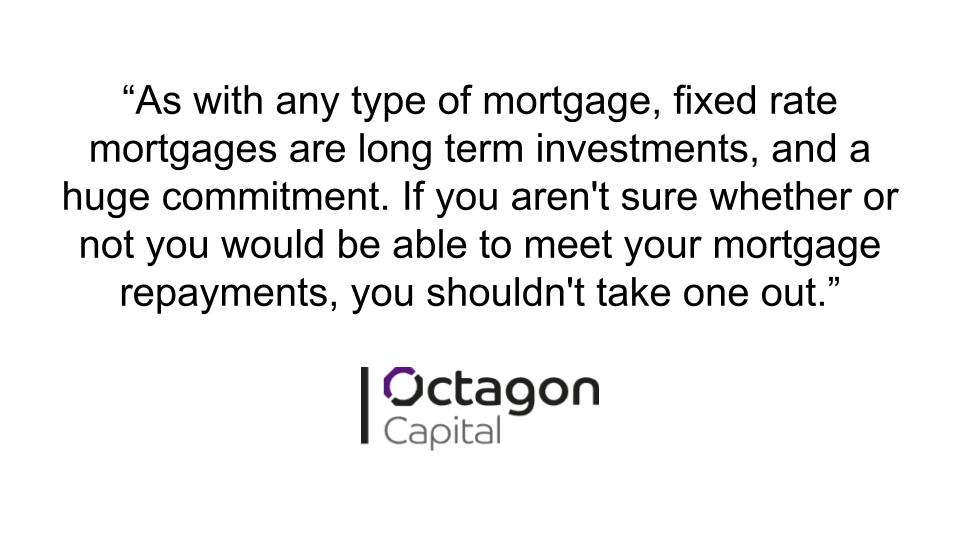
Can I Switch to a Fixed Rate Mortgage?
Yes, it is possible to switch to a fixed rate mortgage. However, to do this, you will most likely need to remortgage.
In the current financial climate, many people are considering switching from a variable rate mortgage to a fixed rate mortgage, because of how volatile the markets are right now. Before you make this decision to switch to a fixed rate mortgage, you should consider all the pros and cons of fixed rate mortgages, and whether it will cost you additional money to do this.
As always, before making any big financial decisions, it's imperative to speak to advisers and also make sure you can afford the move you want to make. Make sure that you are only ever borrowing what you know you can afford to pay back. Defaulting on mortgage repayments or any other loan repayments can result in a cycle of debt due to late fees, as well as a damaged credit score and history.
How Long Does a Mortgage in Principle Last?
Choosing to take out a mortgage is a huge decision for anyone, no matter their circumstances, and one that should never be taken lightly. As your credit rating, capital, and property are all at risk when you take out a mortgage if you fail to make your scheduled repayments, this is a decision you should never rush into.
We've brought together all you need to know about having a mortgage agreement in principle, including how long a mortgage in principle lasts and what happens when it expires. Carry on reading for our Octagon Capital guide to mortgages in principle:
What is a Mortgage in Principle?
Before we get into the details about how long a mortgage agreement in principle lasts, it's important to make sure you fully understand what a mortgage in principle is, and how it differs from a standard mortgage. Mortgage agreements in principle are sometimes known as a decision in principle or a mortgage promise.
Put simply, mortgage agreements in principle are a way of understanding how much money you could borrow, before you actually apply for a mortgage. This involves a soft credit check, which does not impact your credit score. There's also no obligation with a mortgage agreement in principle, meaning you are under no pressure to accept that specific mortgage offer from the lender.
A mortgage in principle is a written indication from a bank or building society that states how much it might be prepared to lend you for a mortgage. Much as decision in principle is not binding on your part, it also is not binding on the part of the lender – they can still refuse to offer you funds for a variety of reasons. Mortgage agreements in principle provide you with an idea of the amount of money you may be able to get as a mortgage, before you start actually applying for one.
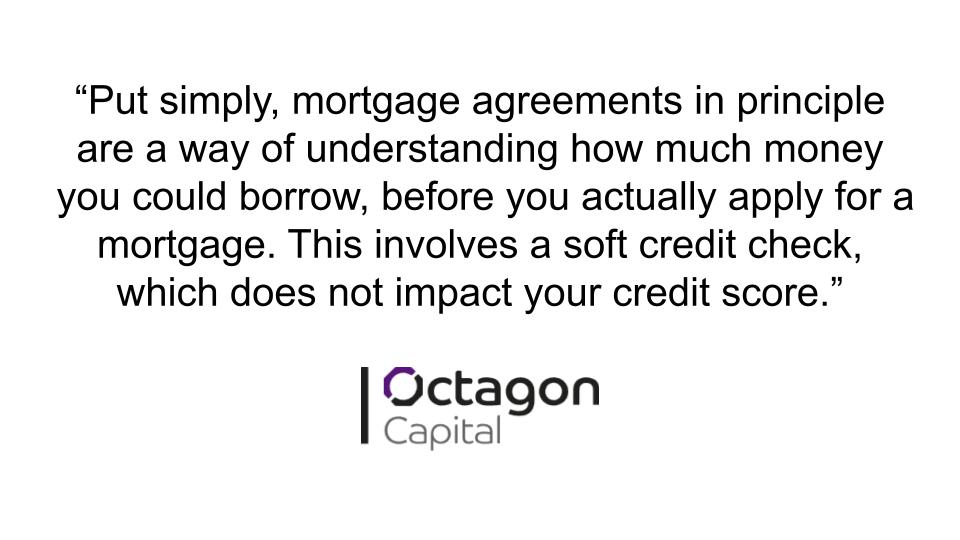
What are the Benefits of a Mortgage in Principle Agreement?
There are several reasons why someone might choose to get a mortgage in principle, but many people choose to get a decision in principle because of the many benefits it offers, and insights it can provide you with. Some of the reasons why someone might choose to take out a mortgage agreement in principle include, but aren't limited to:
- Mortgage amount – you get a clearer understanding of how much money you are likely to be offered as a mortgage.
- Know your limits – by knowing the amount you could get as a mortgage, you can figure out what you can actually afford to spend on a property, helping to ensure you don't go over budget when searching and end up in debt.
- Soft credit check – a mortgage in principle does not involve a full credit check, meaning your credit score will not be impacted. This means that there is no knock-on impact on your ability to take out any other loan products in the future.

How Long Does a Mortgage in Principle Last?
A mortgage in principle typically lasts between 30 and 90 days, however this is dependent on your lender. It's really important to double check the terms of your mortgage in principle with your lender, so you know how long it is valid for.
What Happens if a Mortgage In Principle Expires?
When a mortgage in principle expires, it should be relatively simple to get another one. This means that if you didn't manage to find your dream home in time, you can still use a mortgage in principle going forwards, providing you re-apply. After your original decision in principle expires in 30 to 90 days, you will likely have to re-apply for a new mortgage in principle, on new terms.
Some factors that could impact how easy and quick it is to renew your decision in principle include, but aren't limited to: changes to your income, and significant changes to the economy.
When it comes to property searching and dealing with finances, it can feel like a minefield. That's why we've created this guide to mortgage agreements in principle, and how long they last. Armed with this information, you can continue your search for the perfect property, knowing exactly what you can expect to be able to afford.
You should only ever take out a mortgage – or any type of loan – if you are sure you will be able to meet the scheduled repayments. Defaulting on mortgage repayments can damage your credit score and leave you in greater financial difficulty.
Can I Get a Mortgage on Universal Credit?
Making the decision to buy a house and apply for a mortgage is never something to be taken lightly. Choosing to take out a mortgage is a huge financial commitment that you need to make fully sure you are ready for.
This decision can be made a little more difficult – or even taken out of your hands completely – if you are in receipt of Universal Credit. However, it is still possible to take out a mortgage if you are on Universal Credit as other factors influence lenders' decisions about providing mortgages.
Find out all you need to know about getting a mortgage if you are on Universal Credit with our Octagon Capital guide:
How To Get a Mortgage on Universal Credit
While it can be significantly more difficult to get a mortgage if you are on Universal Credit, it is not impossible. Not all lenders accept benefits towards an income, so it's important to find one that does. Once you have found a suitable lender who accepts Universal Credit towards your income, they will need to conduct various checks to make sure you are suitable for a mortgage product.
Lenders will assess your income amount and type – as they do with anyone applying for a mortgage – as well as your dependency on your Universal Credit payments. They are also likely to take into consideration if you are in receipt of any other types of benefits.
As with any loan products, it's absolutely essential to only ever borrow what you know you can afford to pay back – the same applies to mortgages.

What Checks Will a Lender Conduct?
When attempting to ascertain whether or not you are a suitable candidate for a mortgage, the lender will assess your application against a number of criteria. They will be looking to see whether or not you will be able to repay the mortgage on time. This will include checking your income to see what it consists of, how reliable your income is, and how dependent you are on any benefits you may be in receipt of.
- Your Income & Assets – Lenders will assess what your monthly income is, and what it is made up of. They will also be interested in any other assets you have. Here, additional income sources aside from Universal Credit and other assets will support your mortgage application.
- How Much of a Deposit You Have – Your deposit amount can be the difference between a lender accepting your application or not. Smaller deposits such as 5% or 10% may prove difficult to sway a lender, but higher amounts such as 20% and beyond will work in your favour.
- Which Type of Mortgage You Are Applying For – Certain types of mortgage may be easier to secure on Universal Credit. Some mortgages like Buy to Let don't usually have minimum income requirements.
- How Dependent You Are on Universal Credit – Lenders will be interested in whether or not you are totally dependent on your Universal Credit payments to get by. If you aren't 100% dependent on them, and you have other sources of income, your chances of being approved for a mortgage will be higher.
- If You Receive Any Other Benefits – Lenders will also want to know whether or not you are receiving any other benefits as well as Universal Credit. If you are receiving other benefits and you choose a lender that accepts benefits as a form of income, this can benefit your application.
While it is likely to be more difficult to take out a mortgage if you are on Universal Credit, it is certainly possible. To better your chances of being approved for a mortgage, opt for a lender who accepts benefits as a form of income.
You should only ever take out a mortgage – or any type of loan – if you are sure you will be able to meet the scheduled repayments. Defaulting on payments can damage your credit score and leave you in greater financial difficulty.
What Happens if a Couple Decides to Separate But They Have a Joint Mortgage?
When a couple decides it's best for them to separate, it can be an emotional and confusing time. What can make this situation even more tricky to deal with is if the couple have a joint mortgage. Adding in financial matters to an already difficult situation can seem daunting to say the least.
We've broken down everything you need to know about what happens to a joint mortgage when a couple separates in this guide.
What is a Joint Mortgage?
Before we get into what happens to a joint mortgage when a couple separates, we need to establish what a joint mortgage actually is.
Put simply, a joint mortgage is a mortgage that you take out with other people, whether they be a partner, friend, or family member. In a joint mortgage, all owners share a joint responsibility for making the mortgage repayments. It's a good idea to only ever take out a joint mortgage with someone who you know will be able to keep up the repayments, to avoid your credit score being damaged.
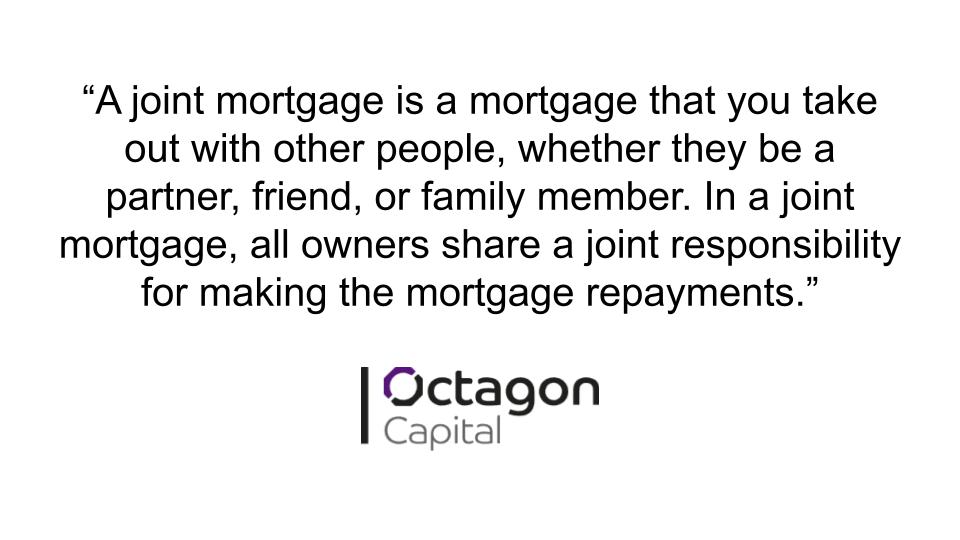
Am I Able to Stop Paying My Joint Mortgage After a Separation?
No, you should not stop paying your joint mortgage after separating from your partner. While it may be a highly emotive and stressful period in your life, it is essential that you keep on top of your scheduled joint mortgage repayments, so as not to negatively impact your credit score and your ex-partner's.
While your mortgage may be at the bottom of your list of priorities during a separation, it's important to continue with your regular payments. Unfortunately, the numbers don't take into account your personal circumstances when it comes to your credit rating. A low credit rating can make it more difficult to take out any kind of loan, not just mortgages, in the future.

What Can I Do When My Partner and I Have Separated But We Have a Joint Mortgage?
When you and your ex-partner signed up for a joint mortgage, you each took on an equal share of the ownership of the property. This means that even in the case of a separation, both you and your ex-partner have the legal right to remain living in the property should you choose to do so. It also means that you are both liable to pay the mortgage.
Thankfully, you do have some options when it comes to your joint mortgage with an ex-partner. Here, we'll go through some of your options:
One Person Can Buy Their Ex-Partner out of The Mortgage
If one person is keen to remain living in the property and has sufficient funds to pay the mortgage repayments alone, they can buy their ex-partner out of the joint mortgage. In cases like these, it's important to contact your lender to make sure they are happy for this to happen, and for the mortgage to be moved into just one person's name. Before this can happen, checks similar to those before you took out your mortgage will likely be made, including making sure the person can afford to keep up the repayments by themselves.
The logistics of how one person buys the other out of the mortgage are largely individual, and depend on various factors, including whether you use a solicitor or not. If the former couple decide to split things evenly, they would work out how much of the mortgage has already been paid, and half this amount. This would then be added to the deposit amount paid by the other person initially, and paid to the individual.
To illustrate, if a former couple wanted to have one buy the other out of their joint mortgage, they would follow the steps outlined above. If they have paid £50,000 towards their mortgage in a 50/50 split and each paid a deposit of £10,000, one person would have to pay the other £35,000 (£25,000 + £10,000) to buy them out of the joint mortgage.
One Person Takes On The Mortgage with a Guarantor
If one person wants to remain in the property and buy the other out of the joint mortgage, but they cannot afford to do so alone, they can use a guarantor. In this instance, the guarantor (usually a friend or family member) will sign a declaration agreeing to pay the mortgage repayments should the individual be unable to do so. The guarantor will have to pass the affordability checks set out by your lender.
Pay Off The Mortgage and Move On
If you and your partner separate when you are close to paying off your joint mortgage, an option is to continue making your scheduled repayments to pay off the remainder of the mortgage, then split the profits. This is likely only a viable option if the former couple are on good terms.
Sell Your Property and Split The Proceeds
Another option for how to deal with a joint mortgage when a couple separates is to sell the property. Once the property has been sold, the ex-couple will need to pay off the remainder of the mortgage, and split any profits – or debt relating to your equity – between you equally.
What is Regulated and Unregulated in Bridging Finance?
Bridging loans or bridge finance, will typically fall under regulated or unregulated activity - and this can have quite an impact on the application process, eligibility and terms that you receive. In this article, Octagon Capital aims to explain the difference between regulated and unregulated bridging - and how you can find the best product for you.
As a rule of thumb:
- Any residential bridging is regulated (if it is their primary residence)
- Any commercial bridging is unregulated (including offices, garages, warehouses)
| Regulated Bridging | Unregulated Bridging |
| 70% Maximum LTV | 75% Maximum LTV |
| First and Second Charge | Mostly Second Charge |
| Subject to Status | All Credit Statuses Considered |
What is the regulation for bridging loans?
When it comes to regulated bridging loans, the FCA is the main regulator in the UK for any mortgages or deals. Essentially, they have strict regulation and guidelines in place to ensure that borrowers do not risk losing their primary residence when borrowing and there is adequate protection in place.
So typically, you can borrow against residential properties, such as buying a place for buy-to-let purposes. However, you cannot borrow a regulated bridging loan if it is secured against your own primary residence.
Part of this is the Mortgage Credit Directive (MCD) which is an EU framework for mortgage firms and is overseen by the FCA. There are a number of measures in place to offer transparency to customers, such as showing them any rates beforehand as an APRC and also giving applicants a reflective period in case they want to change their mind or request more information.
For the regulation surrounding SMCR, this is for senior managers of investment firms under the FCA - and does not apply in this case.

Borrowing against flats and places of primary residence will typically fall under regulated activity
Regulated bridging loans and mortgages are available by first charge or second charge
First charge loans
This refers to the 'first charge' that is taken from your bank account each month, so often refers to as your first mortgage, which could be against your main residence and property that you live at, or an investment.
Second charge loans
This refers to the 'second charge' from your bank account, taken out after your first charge. So you could have a mortgage against your home (this is your first charge) and then another mortgage or bridging loan against an investment product (this is your second charge). You can also get a second charge against your existing home, known commonly as a second mortgage.
Importantly, the amount you can borrow on your second charge is less than your first charge, since it is second in the queue when it comes to repayments each month.
You can use the same lender for both first and second charge, or use a different one for each.
What is unregulated bridging loans?
When bridging loans are unregulated, they are conforming to some essential guidelines, but there are a lot of flexibilities when it comes to the criteria and lending to people with adverse credit histories. Loans in this nature are commonly by means of second charge, and with faster processing and applications, they typically make up around 50% to 60% of all bridging deals (regulated rarely gets more business than unregulated in this sector).
Unregulated business is often for commercial properties including:
- Offices
- Petrol garages
- Schools/ Hotels/ Farmhouses
- Warehouses
- Factories
- Gyms
- Other business purposes

What does non-status bridging loans mean?
Non-status bridging means that it does not take credit status into account. So where regulated mortgages and most financial products require a strong credit score, this is not the case with non-status lending. Therefore, lenders are willing to take a view on adverse credit histories or limited credit histories and may look at other factors such as the potential value of your property and the opportunity.
Chancellor Sunak Proposes Immediate Change to Stamp Duty
Rishi Sunak has stated that a stamp duty cut will not be delayed, following warnings that this would cause considerable damage to the housing market. Talk of delaying the stamp duty cuts have raised fears that property purchases would grind to a halt, as many would simply wait until these cuts were implemented to save themselves thousands of pounds.
Economists and property experts have voiced their concerns over implementation of the cut, originally suggested to be put in place Autumn this year. Such experts have claimed that waiting until this long to put the cut in place could cause a deep freeze to the housing market.
Institute for Fiscal Studies’ Paul Johnson has commented that Sunak must choose to launch the stamp duty cut tomorrow or rule it out entirely, and furthermore that “To do otherwise could ruin the housing market for months to come”
Economist Julian Jessop commented the following on the matter: “the announcement of a stamp duty holiday, but not until the autumn, could kill the housing market in the meantime.”
“There has been similar speculation of an across-the-board VAT cut, which could delay spending on other big ticket items too.”
Others have claimed that this cut to stamp duty could help to drive the demand for housing throughout the U.K., former Tory Chancellor Philip Hammond commenting on the BBC Radio 4 Today programme that:
'Cutting stamp duty, reducing VAT in particular sectors, are certainly ways to bring forward or manage demand.
'But I think the Treasury officials who will have been working up all sorts of proposals for him during the lockdown will be telling him that the history tells us that cutting VAT or cutting stamp duty can bring forward demand but it doesn't overall increase the level of demand, it simply shifts the pattern of it.'
This cut is expected to be part of Sunak’s coronavirus recovery package, including ‘holiday’ from the charge of six months. Sunak is under increasing pressure to set out future plans for financial support for businesses, as many sectors continue to struggle from the effects of the COVID-19 pandemic.
The stamp duty cut is said to be the focus for the Chancellor’s financial address tomorrow, which is also expected to discuss the £2 billion to be used for homeowners to better insulate their properties, and the £1 billion that will attempt to make hospitals and schools greener.
Storage Wars: UK Cities Paying Nearly Double for Self-Storage
- Londoners pay 107% more per week than average for a 50 sq. ft. storage unit
- Camden is the most expensive place to rent storage space in the UK (up to £101.63 p/w)
- Local 100 sq. ft. units cost 8% of a Londoners average wage, 7% of Swansea and 6% of Manchester, Liverpool and Newcastle
New research from bridging loans broker Octagon Capital reveals the cities in the UK getting the worst deals on self-storage units, with Londoners paying significantly over the odds at a rate 107% higher than the national average.
Looking at the average cost of a 50 sq. ft. unit in locations around the country (ideal for storing the contents of a one bedroom flat), London is the most expensive, with customers likely to spend an average of £1,797 per year.
Considerably higher than second place Swansea, which has an average of £1,006 per year for the same sized unit. Exeter residents are getting the best deal in the country, paying 31% less than the nationwide average (£598 p/y).
| Average annual cost for 50 sq. ft. unit (£) | Percentage Difference from Nationwide Average | |
| London | 1,797 | 107% |
| Swansea | 1,006 | 16% |
| Liverpool | 958 | 10% |
| Edinburgh | 892 | 3% |
| Manchester | 882 | 2% |
| Bristol | 833 | -4% |
| Newcastle | 803 | -7% |
| Cardiff | 765 | -12% |
| Birmingham | 745 | -14% |
| Glasgow | 700 | -19% |
| Portsmouth | 650 | -25% |
| Southampton | 650 | -25% |
| Exeter | 568 | -31% |
| Nationwide Average | 868 |
This trend continues when looking at 75 and 100 sq. ft. sized units, ideal for a two-bed flat or house, with London topping both tables and costs averaging 110% and 100% more than the average respectively. Liverpool similarly finds itself at the top end of the table for each unit size analysed, paying 12% more than average for 75 sq. ft. (£1,238 p/y) and 17% more for 100 sq. ft. (£1,674 p/y).
Camden in London has the highest individual costs per year for 75 sq. ft. and 100 sq. ft. units (£3,542 and £5,285 p/y respectively), while also placing second for 50 sq. ft. (£2,909 p/y) behind Kennington (£3,024 p/y).
Even when taking into account the average weekly wage in areas around the country, Londoners are still paying over the odds. For example, a 100 sq. ft. storage unit costs 8% of the average weekly wage of a Londoner, compared to just 3% of Portsmouth residents at the other end of the table. On average, 5% of the weekly wage would be spent on a storage unit in London of this size.
Dan Kettle of Octagon Capital, commented: “There are many factors that affect pricing in cities around the UK, but the large difference in costs between London and the rest of the UK is still significant when you take into account the proportion of the average wage that relates to.
“The best way to get a good deal on self-storage is to ensure you select the right sized unit so you’re not overpaying on space, and always shop around. There may be a better deal with a different company and don’t forget to try and negotiate costs.
“At Octagon Capital we provide bridging loans to assist those looking to embark on a project such as a move, renovation or refurbishment where self-storage is often needed.”
References
Data consists to quotes for various sized self-storage units by Big Yellow, Safestore, Shurgard and Lok’nStore on w.c. 29th July 2020, with annual costs reflecting the weekly cost multiplied by 52
Average wage data via Centre for Cities: https://www.centreforcities.org/data-tool/#graph=map&city=show-all&indicator=average-weekly-workplace-earnings\\single\\2019









